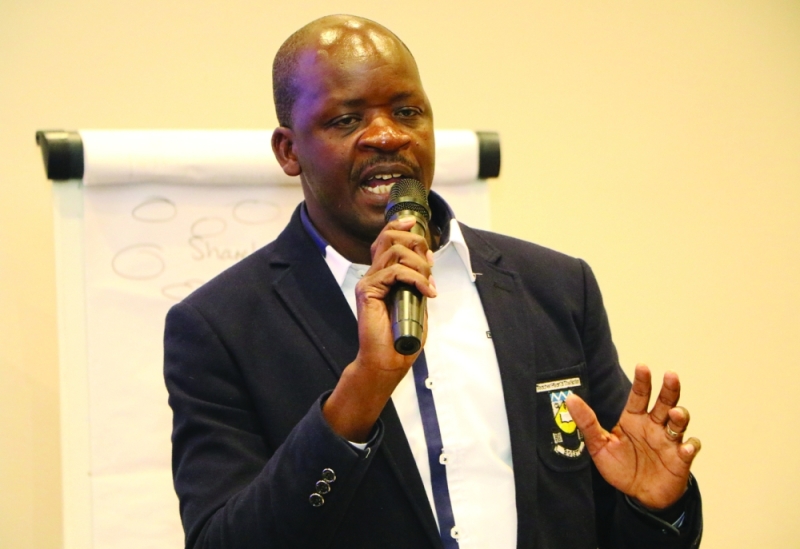Trade union’s golden silence
Kabo Ramasia | Tuesday November 5, 2024 14:00


l Has the trade union influence
gone with the wind?
One wonders whether the days of the maverick, militant and often disruptive trade union figures of our time be brought back. These are men and women who stood for a cause. Men and women who back then used to torment government on the year of elections and pin-point the nation to pressing challenges like unemployment, inequality, poverty, poor infrastructure, education and health challenges as well as the general quality of life.
In recent memory, names like the godfather of unions, the veteran Dr Johnson Motshwarakgole, Ketlhalefile Motshegwa, Tobokani Rari, and Johannes Tshukudu, to mention but a few, were known to be the radical forces behind engineering political discourse on the year of elections. They were known to possess so many prowess to direct who the union members voted for. These were the kind of leaders who albeit their shortcomings stood up to the former president Ian Khama’s presidency and other leaders often described as authoritarian by some observers.
Whilst such a calibre of leaders still remain within the union fold, others have left the dancing stage and have since handed over the baton to a new generation of leaders. However, in contrast, the current union leaders are accused of sleeping with the enemy and to an extent betraying the workers struggle due to their soft stance on issues. Meanwhile, elections have come and gone but the consensus still remains that the 2024 elections proved just how dormant the unions can be.
During the height of trade unionism’s political influence in Botswana, they would categorically spell out issues they expected government to address like unemployment, salaries, workers welfare, etc. In the extreme of cases, as seen in 2014, the unions publicly endorsed the opposition Umbrella for Democratic Change (UDC)). In 2019, union’s approach to elections shifted. Apart from deciding on a political hit list and which party to endorse, which has the interest of workers at heart, they seemed to have had confidence in the then new President Mokgweetsi Masisi. Fast forward to 2024, the silence deepened. Consequently, this has sparked curiosity that even some within the unions themselves cannot explain.
According to political scientist, Mokaloba Mokaloba, trade unions have always been a critical part of a democracy. Mokaloba said a peak into Botswana’s trajectory shows how a very significant number of the voting population belongs to government employees who are mainly unionised.
“Unions as an advocacy of workers’ rights have always been a part of the democratic process,” he said.
However, the political science scholar stated that in this year’s general elections what used to prevail as a norm did not happen. He stated that in the past unions played a much more significant role in elections. He noted that in the past they have had hit lists and distinguished politicians who are pro and anti-workers and who should be voted and who should not be. He added that their input was thus minimal.
“It’s something that has been on the decline,” he said. According to the Botswana Sectors of Educators Trade Union (BOSETU) secretary general (SG), Tobokani Rari, personally he believed that trade unions had a big role to play in politics. He said trade unions are a group of workers that have come together for purposes of the improvement of the conditions of service for their members.
Rari stressed that trade unions need to play a meaningful role in directing who ultimately becomes rulers of the country and ultimately become workers’ employers.
To this end, the BOSETU SG stated that the unions have in the past through their federation, which is the Botswana Federation of Public Private and Parastatal Sector Unions (BOFEPUSU) made certain pronouncements on how each political party as to who should be voted by the workers. Expressing shock, Rari noted that this time around, the federation seem to have been very quiet, which is quite surprising. This time around they have not made a pronouncement on which political party seems to have taken care of the workers, he noted.
For his part, former trade unionist, Mpho Chingapane, said the status of the unions greatly regressed. He said politically, trade unions have been neutralised and have no voice. He outlined that issues of economic and workers welfare have thus been ignored.
“Trade unions currently have no political will and somewhat miraculously expect to see favourable changes in the economic and socio set-up, this intoxicated perception is akin to one who jumps into water and complain of getting wet,” he said.
A press release from the Botswana Land Boards, Local Authorities and Health Workers Union (BLLAHWU) expressed concern on the part of BOFEPUSU for its detachment from the 2024 national elections. The statement was a direct contrast of what transpired in history, highlighted BLLAHWU. The latter further stated that the federation decided to withdraw its position paper from its members despite having agreed to publicise it.
Meanwhile, BOFEPUSU had on October 28, 2024, just two days before elections issued a press release calling on the nation to exercise its right to vote. The union reiterated its mission to stand for the rights of workers and called on the Independent Electoral Commission (IEC) to uphold impartiality at all times.
Botswana’s elections were held on October 30, 2024.
